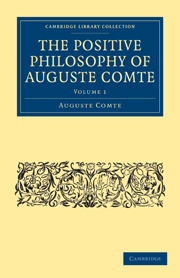CHAPTER I - GENERAL VIEW OF BIOLOGY
Published online by Cambridge University Press: 29 August 2010
Summary
Opposite starting-points in philosophy
The study of the external world and of Man is the eternal business of philosophy; and there are two methods of proceeding ; by passing from the study of Man to that of external nature, or from the study of external nature to that of Man. Whenever philosophy shall be perfect, the two methods will be reconciled: meantime, the contrast of the two distinguishes the opposite philosophies,—the theological and the positive. We shall see hereafter that all theological and metaphysical philosophy proceeds to explain the phenomena of the external world from the starting-point of our consciousness of human phenomena; whereas, the positive philosophy subordinates the conception of Man to that of the external world. All the multitude of incompatibilities between the two philosophies proceed from this radical opposition. If the consideration of Man is to prevail over that of the universe, all phenomena are inevitably attributed to will,—first natural, and then outside of nature; and this constitutes the theological system. On the contrary, the direct study of the universe suggests and developes the great idea of the laws of nature, which is the basis of all positive philosophy, and capable of extension to the whole of phenomena, including at last those of Man and Society. The one point of agreement among all schools of theology and metaphysics, which otherwise differ without limit, is that they regard the study of Man as primary, and that of the universe as secondary,—usually neglecting the latter entirely.
- Type
- Chapter
- Information
- The Positive Philosophy of Auguste Comte , pp. 356 - 398Publisher: Cambridge University PressPrint publication year: 2009First published in: 1853

